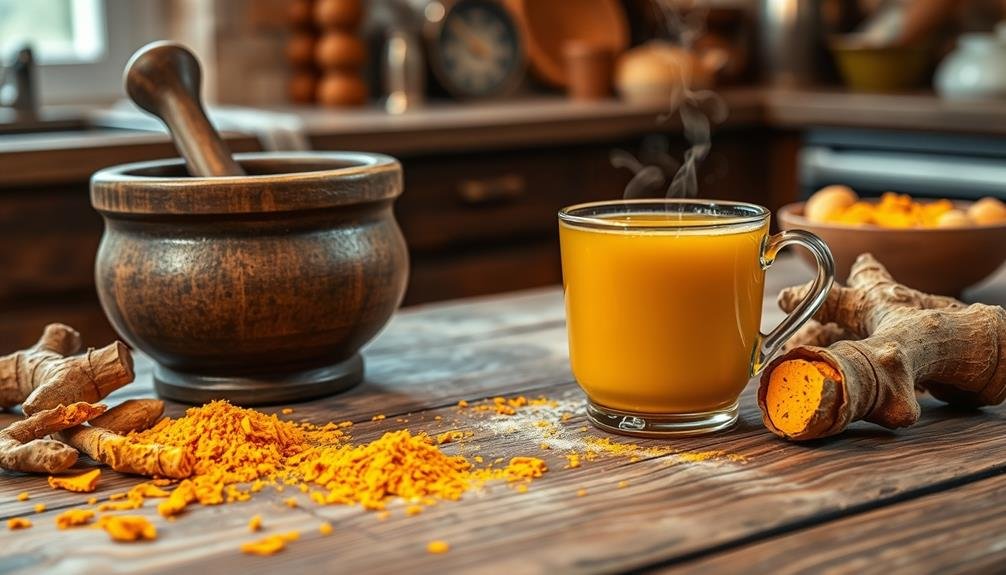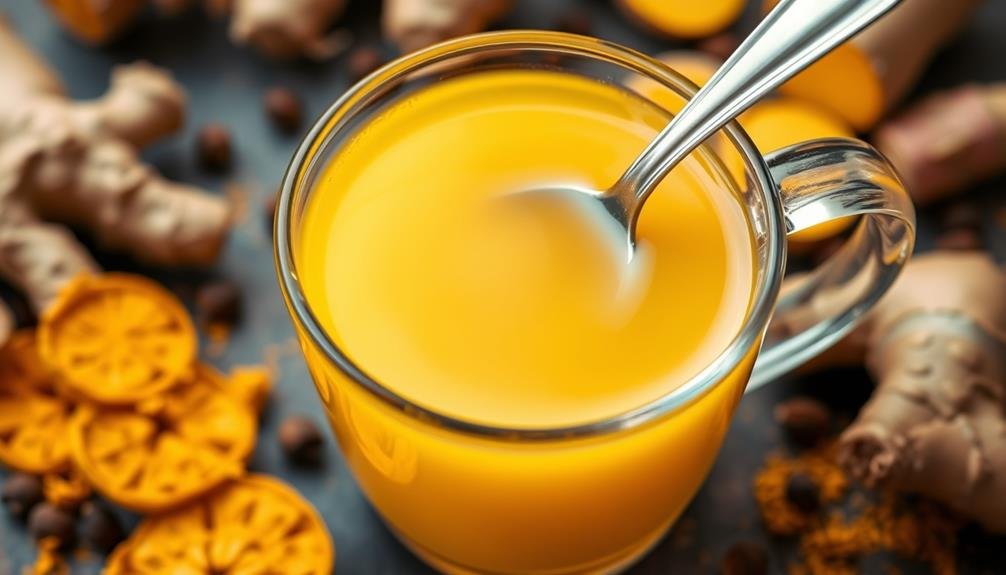Turmeric tea is a powerful anti-inflammatory elixir you can easily make at home. To brew, heat your chosen base liquid (water or plant-based milk) and add 1/2 teaspoon of ground turmeric and a pinch of black pepper. Simmer for 5 minutes, then strain into a mug. You can enhance absorption by including healthy fats and customize flavors with ginger, cinnamon, or honey. This golden brew offers numerous health benefits, from reducing chronic inflammation to boosting brain function and improving digestion. It's best consumed in the morning or before meals for ideal effects. Discover how this ancient remedy can transform your daily wellness routine.
History of Turmeric in Wellness

Antiquity has long recognized the power of turmeric in wellness practices. This vibrant yellow spice, native to Southeast Asia, has been a staple in Ayurvedic medicine for over 4,000 years.
You'll find that ancient civilizations, particularly in India, used turmeric for its anti-inflammatory and antioxidant properties. In traditional Chinese medicine, turmeric has been used to treat various ailments, including digestive issues and joint pain.
The spice made its way to the Western world through trade routes, gaining popularity for its culinary and medicinal uses. You might be surprised to learn that turmeric was even used as a dye for clothing and cosmetics in ancient times.
Modern research has confirmed many of the health benefits attributed to turmeric throughout history. Its active compound, curcumin, has been studied extensively for its potential in treating chronic diseases.
You'll now find turmeric in various forms, from supplements to skincare products. The rise of holistic health practices has further popularized turmeric, with many people incorporating it into their daily wellness routines through teas, lattes, and other beverages.
Understanding Inflammation and Its Effects
You've likely heard about inflammation, but you mightn't realize there are two types: acute and chronic.
Acute inflammation is your body's natural, short-term response to injury or infection, while chronic inflammation persists long-term and can lead to serious health issues.
Understanding the difference is essential, as chronic inflammation is linked to numerous diseases, including heart disease, diabetes, and certain cancers.
Acute vs. Chronic Inflammation
Inflammation is a natural bodily response that plays an essential role in healing and protection. However, not all inflammation is created equal. You'll encounter two main types: acute and chronic inflammation.
Acute inflammation is your body's immediate response to injury or infection. It's short-lived, typically lasting a few days to weeks. You'll notice symptoms like redness, swelling, heat, and pain. This type of inflammation is generally beneficial, helping your body fight off pathogens and repair damaged tissues.
Chronic inflammation, on the other hand, is long-term and can persist for months or even years. It's often silent, without obvious symptoms, but can lead to serious health issues. Chronic inflammation can be triggered by factors like poor diet, stress, or autoimmune disorders. It's associated with various diseases, including heart disease, diabetes, and cancer.
While acute inflammation is a necessary part of your body's defense system, chronic inflammation can be harmful. Managing chronic inflammation through lifestyle changes, including diet and stress reduction, is vital for maintaining overall health and preventing long-term complications.
Health Impacts of Inflammation
The body's inflammatory response, while essential for healing, can have far-reaching consequences on your overall health. When inflammation becomes chronic, it can contribute to a wide range of health issues, affecting various systems throughout your body.
Chronic inflammation has been linked to numerous diseases and conditions, including cardiovascular problems, autoimmune disorders, and even certain types of cancer. It can also impact your daily life, causing persistent pain, fatigue, and reduced mobility. Understanding these health impacts can help you recognize the importance of managing inflammation effectively.
| System Affected | Acute Inflammation | Chronic Inflammation |
|---|---|---|
| Cardiovascular | Temporary increase in heart rate | Increased risk of heart disease |
| Immune | Enhanced pathogen defense | Autoimmune disorders |
| Digestive | Short-term discomfort | Inflammatory bowel diseases |
Turmeric's Active Compound: Curcumin

Curcumin, the active compound in turmeric, is a powerful antioxidant that can protect your cells from damage.
It's renowned for its anti-inflammatory effects, which may help reduce chronic inflammation in your body.
While curcumin has impressive potential benefits, it's important to know that it's not easily absorbed by your body, so you'll want to contemplate ways to enhance its bioavailability.
Potent Antioxidant Properties
Regularly touted as a powerhouse of health benefits, turmeric's active compound, curcumin, boasts potent antioxidant properties. These properties help protect your body from harmful free radicals, which can damage cells and contribute to various diseases. By incorporating turmeric into your diet, you're fundamentally providing your body with a natural defense system against oxidative stress.
Curcumin's antioxidant effects are multifaceted. It not only neutralizes free radicals directly but also stimulates your body's own antioxidant enzymes. This dual action enhances your overall antioxidant defenses, potentially reducing the risk of chronic diseases like cancer, heart disease, and Alzheimer's.
Here's a quick look at how curcumin's antioxidant properties benefit your body:
| Benefit | How It Works | Potential Impact |
|---|---|---|
| Cell Protection | Neutralizes free radicals | Reduces cellular damage |
| Enzyme Boost | Stimulates antioxidant enzymes | Enhances natural defenses |
| Inflammation Reduction | Inhibits inflammatory molecules | Lowers chronic disease risk |
Anti-Inflammatory Effects Explained
Notoriously one of turmeric's most celebrated benefits is its powerful anti-inflammatory effect, primarily attributed to curcumin. This active compound in turmeric works by targeting multiple steps in the inflammatory pathway at the molecular level.
When you consume turmeric tea, curcumin inhibits the production of inflammatory molecules like cytokines and prostaglandins. Curcumin also blocks the activation of NF-kB, a protein complex that plays an essential role in inflammation when triggered.
By suppressing these inflammatory responses, turmeric can help alleviate symptoms associated with various chronic conditions. You'll find it particularly beneficial for managing arthritis pain, reducing muscle soreness after exercise, and easing digestive inflammation.
What's more, curcumin's anti-inflammatory properties extend to supporting brain health. It can cross the blood-brain barrier and help reduce inflammation associated with neurodegenerative diseases.
When you regularly drink turmeric tea, you're not just soothing your body but also potentially protecting your brain.
Bioavailability and Absorption
Turmeric's potent compound, curcumin, faces a significant challenge when it comes to absorption in the human body. Despite its powerful anti-inflammatory properties, curcumin has low bioavailability, meaning your body can't easily absorb and utilize it. This is primarily due to its poor solubility in water and rapid metabolism in the liver and intestinal wall.
To enhance curcumin's bioavailability, you can employ several strategies. Adding black pepper to your turmeric tea is a game-changer. Piperine, the active compound in black pepper, can increase curcumin absorption by up to 2000%.
Combining turmeric with healthy fats like coconut oil or ghee also boosts absorption, as curcumin is fat-soluble.
Heat plays a role too. When you prepare your turmeric tea, the warmth helps break down the curcumin, making it more readily available for your body to absorb.
Additionally, consuming turmeric regularly over time can lead to better absorption as your body becomes more efficient at processing it.
Benefits of Drinking Turmeric Tea
Sipping on turmeric tea can offer a host of health benefits. This golden elixir's primary active compound, curcumin, is known for its potent anti-inflammatory and antioxidant properties. By incorporating turmeric tea into your daily routine, you're providing your body with a natural boost to combat various health issues.
Regular consumption of turmeric tea may help:
- Reduce inflammation throughout your body
- Support brain function and memory
- Improve digestion and gut health
- Boost your immune system
These benefits stem from curcumin's ability to target multiple cellular pathways, potentially lowering your risk of chronic diseases.
You'll also find that turmeric tea can aid in managing arthritis pain, alleviating symptoms of depression, and even supporting heart health by improving endothelial function.
Moreover, turmeric tea's warming properties make it an excellent choice for soothing sore throats and easing congestion during cold and flu season.
It's also a caffeine-free alternative to coffee, providing a gentle energy boost without the jitters.
Essential Ingredients for Turmeric Tea

To craft your perfect cup of turmeric tea, you'll need to gather a few key ingredients.
Start with essential spices and herbs, focusing on turmeric as the star and considering complementary additions like ginger, cinnamon, or black pepper.
For your base liquid, you can choose between water, various types of milk, or even bone broth, depending on your taste preferences and desired health benefits.
Key Spices and Herbs
The heart of any good turmeric tea lies in its carefully chosen spices and herbs. While turmeric is the star, other ingredients play essential supporting roles in enhancing both flavor and health benefits. You'll want to experiment with different combinations to find your perfect blend.
Consider incorporating these key spices and herbs into your turmeric tea:
- Ginger: Adds warmth and complements turmeric's anti-inflammatory properties
- Black pepper: Enhances turmeric absorption and provides a subtle kick
- Cinnamon: Offers sweetness and helps regulate blood sugar levels
- Cardamom: Brings a unique aroma and aids digestion
Don't be afraid to mix and match these spices to create your signature blend. You can also add a touch of honey or lemon for extra flavor and health benefits.
Remember, fresh ingredients will yield the best results, but high-quality dried spices can work well too. When selecting your spices, opt for organic options whenever possible to avoid pesticides and guarantee maximum potency.
Base Liquid Options
While spices and herbs provide the flavor profile, your choice of base liquid forms the foundation of your turmeric tea. Water is the most common and versatile option, allowing the turmeric and other spices to shine through.
For a richer taste, you can use plant-based milk alternatives like almond, coconut, or oat milk. These options add creaminess and complement turmeric's earthy flavor.
If you're looking for additional health benefits, consider using green tea as your base. It'll infuse your drink with antioxidants and a subtle grassy note.
For a caffeine-free option, try rooibos tea, which adds a nutty sweetness. Bone broth is an unconventional but nutrient-dense choice, perfect for those seeking extra protein and minerals.
You can also experiment with fruit juices like orange or pineapple for a sweeter, more tropical twist. These options pair well with turmeric and can help mask its sometimes bitter taste.
For a warming, spicy base, try ginger tea or cinnamon-infused water. These combinations enhance the anti-inflammatory properties of your turmeric tea while adding depth to its flavor profile.
Step-by-Step Brewing Instructions
Now that you've gathered your ingredients, let's plunge into the brewing process.
Begin by heating your chosen base liquid in a small saucepan over medium heat. As it warms, add 1/2 teaspoon of ground turmeric and a pinch of black pepper. Stir well to combine, ensuring there are no clumps.
Once the mixture starts to simmer, reduce the heat to low and let it gently cook for about 5 minutes. This allows the flavors to meld and the turmeric to fully infuse into the liquid.
Next, remove the pan from heat and strain the tea through a fine-mesh sieve into your mug.
To enhance your turmeric tea's flavor and health benefits, consider these optional additions:
- A squeeze of fresh lemon juice for vitamin C
- A teaspoon of raw honey for sweetness and antibacterial properties
- A dash of cinnamon for added warmth and blood sugar regulation
- A small piece of fresh ginger for extra anti-inflammatory power
Stir in your chosen additions, adjusting to taste.
Let the tea cool slightly before sipping to fully appreciate its soothing warmth and earthy flavor. Enjoy your homemade anti-inflammatory elixir, knowing you're nourishing your body with each comforting sip.
Enhancing Absorption With Black Pepper

Ever wondered why black pepper is often paired with turmeric? It's not just for flavor. Black pepper contains a compound called piperine that notably enhances the absorption of curcumin, the active ingredient in turmeric.
By adding a pinch of freshly ground black pepper to your turmeric tea, you'll boost its bioavailability and maximize its health benefits.
When you're brewing your turmeric tea, add about 1/4 teaspoon of freshly ground black pepper per cup. If you're sensitive to pepper's heat, start with a smaller amount and adjust to your taste. The piperine in black pepper can increase curcumin absorption by up to 2000%, making your turmeric tea much more potent.
For an extra kick, you can also add a slice of fresh ginger to your tea. Ginger complements turmeric's flavor and offers additional anti-inflammatory properties.
Flavor Variations and Add-Ins
Exploring flavor variations and add-ins can transform your basic turmeric tea into a delightful and personalized beverage. You'll find endless possibilities to enhance both taste and health benefits.
Try adding a splash of coconut milk for a creamy texture and tropical twist, or squeeze in some fresh lemon juice for a zesty kick that also aids in nutrient absorption.
For those with a sweet tooth, consider natural sweeteners like honey or maple syrup. They'll not only balance the earthy flavor of turmeric but also contribute their own health-promoting properties.
Experiment with these popular add-ins:
- Ginger: Adds warmth and complements turmeric's anti-inflammatory effects
- Cinnamon: Provides a sweet, spicy note and helps regulate blood sugar
- Cardamom: Offers a unique, aromatic flavor and supports digestion
- Mint leaves: Brings a revitalizing taste and soothes the stomach
Don't be afraid to mix and match these ingredients to create your perfect blend. You might discover a combination that not only tastes great but also addresses your specific health needs.
Best Time to Consume

The ideal time to enjoy your turmeric tea often depends on your personal goals and lifestyle. For many, starting the day with a warm cup of turmeric tea can boost metabolism and provide an anti-inflammatory kickstart. It's a great alternative to coffee, offering a caffeine-free energy boost.
If you're looking to improve digestion, consider drinking turmeric tea about 30 minutes before meals. This can help stimulate digestive enzymes and reduce bloating.
For those seeking better sleep, a cup of turmeric tea an hour before bedtime can promote relaxation and reduce inflammation that might interfere with rest.
Athletes and fitness enthusiasts might benefit from drinking turmeric tea post-workout to aid in recovery and reduce muscle soreness. If you're battling a cold or flu, sipping turmeric tea throughout the day can help boost your immune system and ease symptoms.
For maximum absorption of curcumin, turmeric's active compound, it's best to consume your tea with a meal that contains healthy fats. This enhances the bioavailability of curcumin, allowing your body to reap more of its anti-inflammatory benefits.
Potential Side Effects
While turmeric tea offers numerous health benefits, it's important to be aware of potential side effects. Consuming excessive amounts of turmeric can lead to digestive issues, such as nausea, diarrhea, or stomach upset. If you're prone to these symptoms, start with smaller doses and gradually increase your intake.
Be cautious if you're taking blood-thinning medications, as turmeric may enhance their effects and increase the risk of bleeding. Consult your healthcare provider before incorporating turmeric tea into your routine if you're on any medications.
Some people may experience allergic reactions to turmeric, although this is rare. Watch for signs such as:
- Skin rashes or hives
- Difficulty breathing
- Swelling of the face, lips, or tongue
- Itching or tingling sensations
If you're pregnant or breastfeeding, limit your turmeric intake, as its effects on fetal development and infants aren't fully understood.
Additionally, those with gallbladder issues should avoid large amounts of turmeric, as it can stimulate bile production and worsen symptoms.
Storing and Preserving Turmeric Tea

Proper storage of your turmeric tea can help maintain its flavor and potency for longer periods.
After brewing, let your tea cool to room temperature before transferring it to an airtight container. Glass jars or bottles work best, as they won't absorb flavors or odors. Store the tea in the refrigerator for up to 3-4 days.
If you've made a large batch, consider freezing portions for later use. Pour the cooled tea into ice cube trays and freeze. Once frozen, transfer the cubes to a freezer-safe bag or container. This method allows you to thaw only what you need, and the tea will last for up to 3 months.
For dry turmeric tea blends, store them in an airtight container in a cool, dark place. Avoid exposure to light, heat, and moisture, which can degrade the tea's quality. Properly stored, dry blends can last up to 6 months.
To preserve the tea's freshness, always use clean utensils when scooping out dry blends or pouring liquid tea. This prevents contamination and extends the tea's shelf life.
Comparing Turmeric Tea to Supplements
Frequently, people wonder whether drinking turmeric tea offers the same benefits as taking turmeric supplements. While both forms can provide anti-inflammatory properties, there are some key differences to evaluate.
Turmeric tea offers a more natural and holistic approach to consuming this beneficial spice. When you brew turmeric tea, you're getting the whole plant's compounds, including essential oils and other beneficial components that might be missing in supplements. The warm liquid also aids in absorption and can be soothing for your digestive system.
Here are some advantages of turmeric tea over supplements:
- Easier to adjust dosage based on your needs
- Often more affordable than high-quality supplements
- Can be combined with other beneficial ingredients like ginger or black pepper
- Provides hydration along with health benefits
However, supplements may offer higher concentrations of curcumin, the active compound in turmeric. They're also more convenient for those with busy lifestyles.
Ultimately, the choice between tea and supplements depends on your personal preferences, health goals, and lifestyle. Consult with a healthcare professional to determine the best option for you.
Incorporating Turmeric Tea Into Routines

Incorporating turmeric tea into your daily routine can be a simple yet effective way to boost your health. Start by replacing your morning coffee or afternoon pick-me-up with a cup of turmeric tea. You'll still get a warm, comforting drink while reaping the anti-inflammatory benefits.
Consider preparing a large batch of turmeric tea concentrate at the beginning of the week. Store it in the refrigerator and dilute it with hot water or milk as needed. This makes it easy to enjoy a cup anytime without the hassle of daily preparation.
If you're always on the go, invest in a quality thermos to keep your turmeric tea warm throughout the day. You can also experiment with iced turmeric tea for a revitalizing summer beverage.
For those who struggle with the taste, try blending turmeric tea into smoothies or using it as a base for golden milk lattes. You can even incorporate it into your cooking by using it as a liquid base for soups, stews, or rice dishes.
Frequently Asked Questions
Can Turmeric Tea Stain Teeth or Dental Work?
Yes, turmeric tea can stain your teeth and dental work. Its vibrant yellow color contains compounds that may cause discoloration. You'll want to rinse your mouth after drinking or use a straw to minimize contact with your teeth.
Is It Safe to Drink Turmeric Tea During Pregnancy or Breastfeeding?
You should consult your healthcare provider before drinking turmeric tea during pregnancy or breastfeeding. While it's generally considered safe in moderation, it may affect certain individuals differently. Always prioritize professional medical advice for your specific situation.
How Long Does It Take to See Benefits From Drinking Turmeric Tea?
You'll likely notice benefits from drinking turmeric tea within 4-8 weeks of regular consumption. However, some people report feeling effects sooner. It's important to maintain consistency and pair it with a healthy lifestyle for best results.
Can Turmeric Tea Interfere With Certain Medications or Medical Conditions?
Yes, turmeric tea can interfere with certain medications and conditions. It may interact with blood thinners, diabetes drugs, and stomach acid reducers. If you're pregnant or have gallbladder issues, you should consult your doctor before consuming turmeric regularly.
Is It Possible to Develop an Allergy to Turmeric Tea?
Yes, it's possible to develop an allergy to turmeric tea. While rare, you could experience symptoms like itching, hives, or difficulty breathing. If you're concerned, consult your doctor before consuming turmeric regularly or in large amounts.
In Summary
You've now discovered the power of turmeric tea as a natural anti-inflammatory elixir. By incorporating this golden brew into your daily routine, you're taking a step towards better health. Remember to use high-quality ingredients and experiment with flavors to find your perfect blend. While turmeric tea isn't a cure-all, it's a delicious and soothing way to support your body's wellness. Give it a try and see how it makes you feel!





Leave a Reply